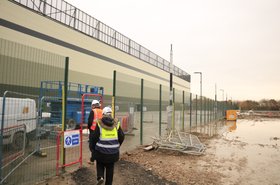London beat out Dublin, Amsterdam, and Frankfurt to reign as the largest colocation market in Europe this year, in terms of new ‘built IT power,' and the second largest in the world.
That’s according to the latest Data Centre Report from property advisor Knight Frank, covering markets across the EMEA region.
Growth across the board
London enjoyed a 52MW take-up in the third quarter alone, bringing its year-to-date take-up to 139MW - almost double the 77MW recorded in 2019. Capacity across London has increased, with more than 420MW of new schemes either live, under construction or phased, according to Knight Frank.
Frankfurt, meanwhile, trails London with 25MW of take-up in the third quarter and 105MW throughout 2020 so far.
Figures for Amsterdam, meanwhile, reflect the impact of a data center moratorium, with no major transactions reported in the third quarter and a year-to-date take-up of just 21MW. However, with the moratorium recently lifted, Amsterdam is expected to gain traction as a data center destination during 2021.
Knight Frank believes that Europe’s second-tier markets will increase in importance during 2021, driven by the evolution of Copenhagen, Madrid, and Warsaw as regional public cloud hubs. It also expects a resurgence of Paris, which is well down this year.
In terms of total installations, Dublin remains the most popular market in Europe, with 795.8 built megawatts across 36 properties, followed by Amsterdam with 739.8 built megawatts across 65 properties, and London third with 728.25 megawatts across 137 properties, according to the Knight Frank report, drawing on data from DC Byte.
Dublin remains a highly popular location as a pan-European center and headquarters for many companies, particularly US multinationals, with the country’s state-owned power company expecting a doubling of demand in the coming years, according to planning applications filed with local authorities there.
A large chunk of London’s popularity as a location, despite its high property costs, is its financial center, the largest in Europe, with clients requiring data centers close to where their deals are executed in order to minimize latency. The full impact of Brexit on this center has yet to be felt, however.
Amsterdam, meanwhile, benefits from good communication links, with 11 of 15 Internet submarine cables between the US and Europe coming through the Netherlands, as well as a high-speed metropolitan-area fiber network, and ease of physical access via Royal Schipol Airport.




